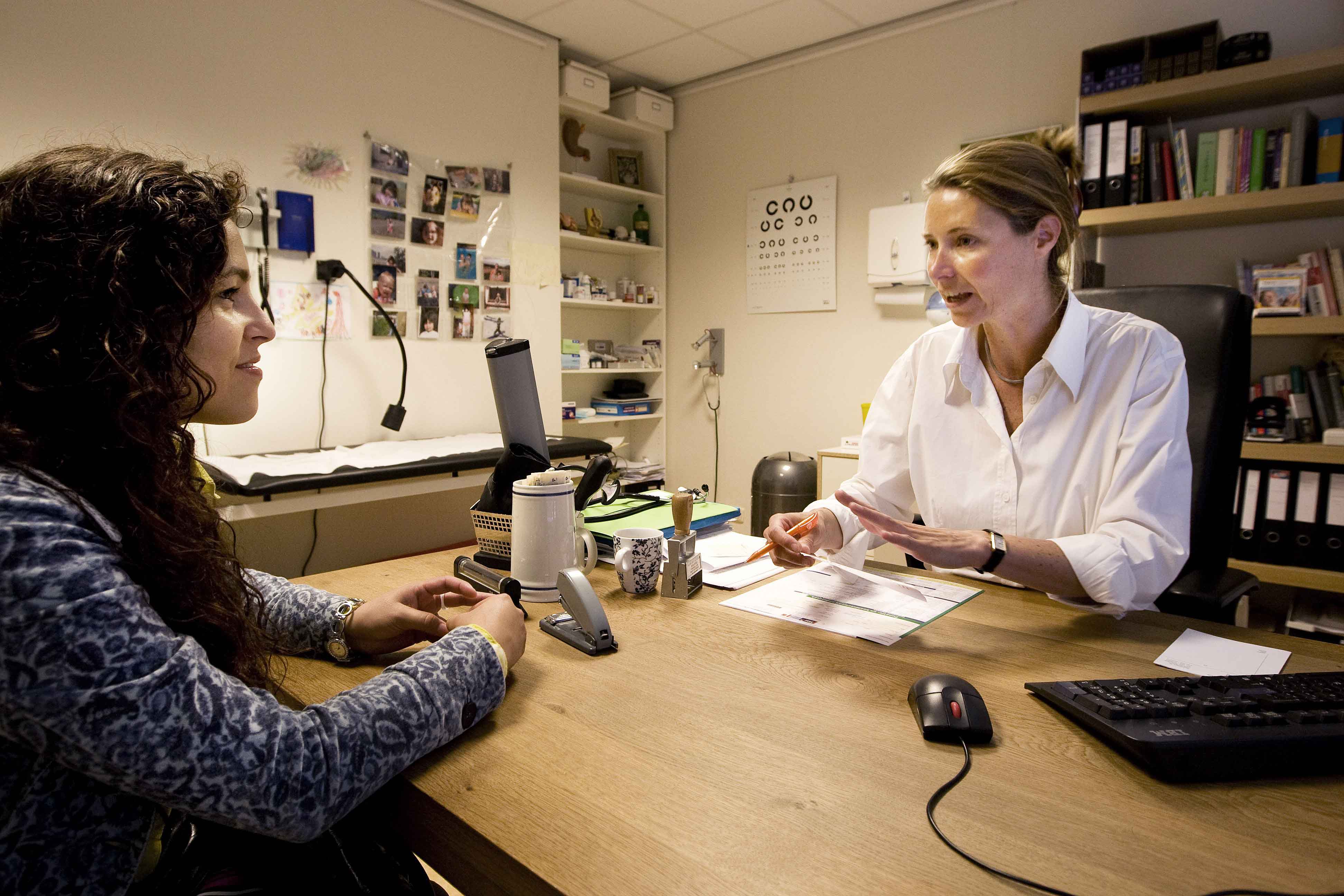Medicine still subjects to male bias
Headaches, backache, fatigue… Aranka Ballering studied the course of illness in people with common symptoms, from the onset of their symptoms to their first GP appointment. She also investigated the role played by sex and gender in how these symptoms are treated. One of the most striking findings to emerge from her research was that on average, women have a different – and less extensive – course of illness than men.
Text: Kirsten Otten
In her previous job with the Dutch Ministry of Foreign Affairs, health scientist Aranka Ballering’s focus was on feminist foreign policy. ‘This is a field in which the Netherlands is often considered to be extremely forward-thinking, but I was aware that even here, there is so much more that could be done. In 2019, when I saw that the UG was offering a PhD position for research into gender and sex differences in the Dutch healthcare system, I decided it was for me.’ Last April, Ballering was awarded the ‘cum laude’ distinction for her PhD research.

Patient journey
In her research, Ballering mapped the entire ‘patient journey’ that people embark on when confronted with common physical symptoms, such as headaches, backache or fatigue, which are not sex-specific, often arise spontaneously, sometimes disappear by themselves, and for which a direct cause cannot always be found. ‘I wanted to look at the effect of sex and gender on this patient journey, from the onset of symptoms to their initial appointment with their GP.
To that end, I charted an extensive range of factors, such as which gender roles were present and to what extent, how often the symptoms occurred, and how long they lasted.’ In her research, Ballering was able to make use of large quantities of health data held by Lifelines (biobank for the Northern Netherlands), as well as the UG-UMCG-based long-term multi-disciplinary research programme, Trails, and FaMe-net, a database in which GPs register in detail what happens during a consultation.
Gender roles
The first step in Ballering’s research was to develop a gender score. ‘We needed this to help us gain an understanding of the effect of gender roles – behavioural norms that are deemed to be typically masculine or feminine – on physical symptoms. For example, being the breadwinner is traditionally viewed as a masculine gender role, whereas caring responsibilities are considered feminine. Our research revealed that feminine gender roles are associated more strongly with physical symptoms than masculine gender roles are. We found, for example, that men in more typically feminine gender roles report physical symptoms more frequently than men in masculine gender roles. We were not able to find an explanation for this tendency. Future research may provide more answers.’
Men are more likely to be given a referral
Ballering then studied the differences between men and women when it comes to seeking help. ‘We found, for example, that women visit their GP to discuss common physical symptoms more often than men do. But we also found that individual women actually experience symptoms more often.’ Ballering believes that this is because women are more ‘interoceptive’ than men. ‘They are more aware of their bodies and the physical changes they are going through than men are. The reason for this is thought to lie in the fact that women menstruate, can become pregnant, and can breastfeed, so they are naturally more inclined to pay attention to what is going on in their bodies.’
Ballering found that even though women attend GPs’ surgeries more frequently than men, men are more likely to be given a physical examination during their surgery appointment. That is not all: the probability of men being sent for an echo or an X-ray (or similar) is 8% higher and the chance of them being referred to a specialist is 15% higher than for women of the same age with the same symptoms and the same comorbidities (other conditions, ed.). ‘That was definitely the most remarkable finding to emerge from my research. Colleagues at Radboud University in Nijmegen who studied transcripts of doctor’s appointments saw almost no difference in the language used by female patients and the language used by male patients during an appointment. So, it is highly unlikely that the verbal communication that goes on in the GP’s consultation room has anything to do with the differences in the way men and women tend to be treated.’

Are women at a disadvantage?
What does Ballering think is behind this phenomenon? ‘Your first hunch might be that GPs take women less seriously. But that would be an overly simplistic answer. If you look at the situations in which women do get a referral, that referral leads to a new diagnosis much less often than it does when men are referred. These women’s headaches are found to be headaches and their nausea is found to be nausea. This is called symptom diagnosis. Based on this finding, we can conclude that existing diagnostics are somewhat less effective for women than for men. This pattern is borne out by GPs’ clinical experience, and they act accordingly. But you cannot conclude that women are being placed at a disadvantage unless you can demonstrate that the symptom diagnoses that these women receive are inaccurate. And we don’t know whether that’s the case. We simply don’t know whether a symptom diagnosis is changed to the diagnosis of a condition or disease – with an identifiable cause – more often in women than in men. My research reveals that there are differences, but not necessarily that there is a difference in the quality of care.’
Redressing the balance
This makes it difficult for Ballering to know how best to advise GPs. ‘GPs don’t just see a man or a woman. They see a patient with a certain family history, context, socio-economic status, ethnicity, education, and so on, as well as someone with a particular sex, gender, and sexual orientation.’ Ballering’s research makes clear that the focus in medical science has long been weighted towards men. ‘The general idea is that medicine is always neutral. But actually, it is biased towards men. We are now working hard to redress the balance by including women in medical and biomedical research and by explicitly asking researchers to study men and women and to pay particular attention to the female cells, female rats, and female test subjects. Researchers have a special role to play here because the new insights they gain into the female body will filter down into medical practice.’
Aranka Ballering (1994) studied Human Health and Life Sciences, followed by a Master’s degree in Biomedical Sciences with a focus on immunology and international public health at the VU Amsterdam. She then took a Master’s degree in Global Health in Maastricht. This included research into the social stigma surrounding leprosy in India. In April 2024, the UG awarded her the ‘cum laude’ distinction for her PhD research into the relationship between sex, gender, and common somatic symptoms. She has now received a Rubicon grant via the Netherlands Organisation for Health Research and Development (ZonMw) to conduct research within the Sociology Department at Ghent University. ‘My focus will still be on physical symptoms as experienced by women as opposed to men, but from a different perspective. I will now be devoting my attention specifically to persistent physical symptoms and the stigma associated with them.’
| Last modified: | 16 July 2024 1.21 p.m. |
More news
-
27 August 2024
UMCG gaat onderzoeksfaciliteiten beschikbaar stellen voor geneesmiddelenontwikkeling
Om de beschikbaarheid en effectiviteit van geneesmiddelen in Nederland te verbeteren gaat het UMCG het bedrijf G² Solutions opzetten. Dit bedrijf moet ervoor gaan zorgen dat belangrijke technologische ontwikkelingen op het gebied van DNA sequencing...
-
17 July 2024
Veni-grants for ten researchers
The Dutch Research Council (NWO) has awarded a Veni grant of up to €320,000 each to ten researchers of the University of Groningen and the UMCG. The Veni grants are designed for outstanding researchers who have recently gained a PhD.
-
06 June 2024
Wiro Niessen Captain of Science of Top Sector Life Sciences & Health
Wiro Niessen, dean of the Faculty of Medical Sciences, has been appointed Captain of Science of the Top Team of the Top Sector Life Sciences & Health (LSH) by Minister Adriaansens of Economic Affairs and Climate. His appointment is effective 1 June...
